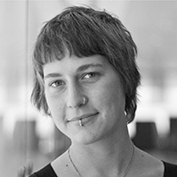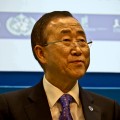Women of COP18
Sophie Trevitt | December 3, 2012.

Last week, on the United Nations’ Gender Day, UNFCCC Executive Secretary Christiana Figueres sat on a panel with Qatari Royalty , the former President of Ireland, the Minister of International Relations and Co-operation of the Republic of South Africa, the Assistant Secretary General of the World Meteorological Organisation, the Director-General of the International Union for Conservation of Nature and the Director of Sustainability at Masdar.
The surprising thing about this panel of directors, royalty and secretaries is that they were all women. Every last one.
We know in Australia that women are significantly underrepresented in executive positions. The disparity is far worse in a global context, which is why it was so remarkable not just that the panel was autonomously female; but that the women held such diverse and influential positions.
Her Royal Excellency Sheikha Mayassa bint Hamad Al-Thani encapsulates some of the apparent contradictions that characterise the climate talks in Qatar. Qatar is abundant in oil and natural gas and is the highest per capita emitter in the world. Yet, it is the host for this years climate change negotiations. Her Excellency is sitting on a panel to discuss gender equality and climate change; yet she is dressed in the tradition Abaya which many westerners associate with the oppression of women. Her Excellency has an answer to these contradictions, and that is that they are not contradictions at all; they are simply part of a process of formulating both individual and national identities.
At a TEDx event, Her Excellency explained; “We know modernisation is happening.” “We are changing our culture from within but at the same time we are reconnecting with our traditions”. She has tasked herself with the cultural enlivening of Qatar through the burgeoning modern art industry and the Qatar Film Institute. Moreover, she is determined not only to build bridges between the East and the West but to “break down the walls of ignorance” that divide them. Qatar is an oil and gas rich country that has contributed to the impending disaster that is climate change. Yet, this does not negate Qatar’s own vulnerability as one of the ten developing countries likely to be affected by rising sea levels.
Mary Robinson, former President of Ireland, wryly conceded to Figueres that she too “shared a sense of the slight frustration” of women being left out of the process when climate change is central to the experiences of women all over the world. We know that women disproportionately suffer due to climate change – they are more likely to die in natural disasters, are forced to cope with increased workload due to their role as caregivers, they have to travel further and in less secure conditions to obtain food and water in situations of scarcity and they are more likely to become victims of violence in situations of armed violence provoked by climate change related events.
Maite Nkoana-Mashabane, Minister of International Relations and Co-operation of the South Africa, talked with the dry sense of humour that emerges when compassion and determination butt heads in order to get things done. Figueres called her the “motor of everything that happened in Durban” and asked Nkoana-Mashabane what she thought was holding women back.
Her answer? Men. “Just how masculine it is. The fact that ninety percent of chief negotiators are men, serviced by women, might explain perhaps why it is slow. And it moves when it is driven by women”. Quips aside, the Minister talked about South Africa as “a non-sexist state constitutionally”. She expands, “it is not enough to have that constitutional, we have to work to make sure the principles of that constitution are given content”.
South Africa works using a quota system, something that conservative western countries like Australia and America find abhorrent. Australians in particular have an irrational fear of positive affirmation. Nkoana-Mashabane considers it essential to ensuring women are “part of the bigger story” and not simply the footnote.
Elena Manaenkova, Assistant Secretary General of the World Meteorological Organization is most certainly not in the footnote. She described herself as a meteorologist first, Russian second. She talked about the practical necessity of meteorology – about mothers as meteorologists who have to dress their children for possible changing weather conditions, and the responsibility of her profession to provide concrete information about when and where to plant seed. She stressed the lived experiences of women in a world affected by climate change where “the past is no longer a reliable indicator of the future”.
Each of the women on the panel has contributed enormously to finding solutions to climate change. Female leaders are critical to shifting the paradigm that assumes men will be the decision makers. Her Excellency’s caution about misrecognising multiple interests or concurrent priorities as contradictions rings true when it comes to climate change.
Just as it is possible for Qatar to be the world’s greatest emitter per capita and still want action on climate change; it is possible for wealthy women of the Middle East to stand alongside the women of impoverished Congo as vulnerable in the face of climate change and demand to be a part of the decisions that will shape their lives.
Discussions like this are important because they show that women can have an impact on issues like climate change. Yet, as women tally higher in death counts after natural disasters, are subjected to more violence in climate related conflict, and suffer more illness; it is vital that those men and women who have the privilege of a voice within the climate change negotiations, ensure that the voices of the most disenfranchised and the most affected are heard.
By Sophie Trevitt, photo by Laura Owsianka.











comment